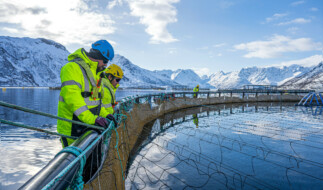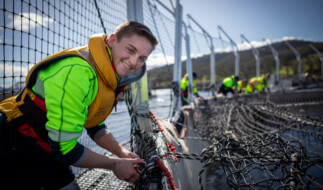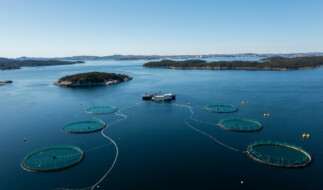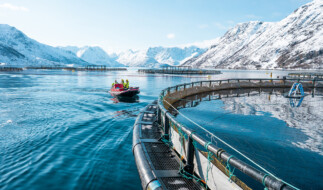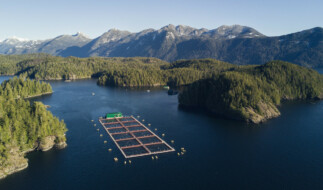GSI's members are committed to working collaboratively on new approaches to improve the health and welfare of the salmon we farm, ensuring they are raised to be better for people and planet.
Improving fish welfare
Continuously improving the health and welfare of the fish we raise is not on only an ethical responsibility, but a priority we take incredibly seriously. Optimal fish welfare depends on a range of biological and environmental factors including, but not limited to, living conditions, health, and nutrition. By ensuring optimal fish welfare, we are farming healthier, higher-quality fish, which also improves productivity and sustainability performance. As farmers of the sea, we share our waters, which is why we work together on fish welfare to better understand our interactions with each other and the environment. Plus, by collaborating, we can develop innovations and incorporate improvements at speed and at scale to improve the salmon farming sector as a whole.
Fish Health and Welfare Task Force
This GSI task force meets regularly to identify and share industry leading best practices on key topics including reducing the use of antibiotics, managing and preventing sea lice, supporting optimal fish health, preventing illness, as well as assessing possible impacts from climate change.
Welfare standards
GSI members are committed to continuous improvements in salmon farming to ensure the highest possible welfare standards for our fish. Each of our members follows the ’Five Freedoms’ for animal welfare and guidance from the World Organization for Animal Health (OIE) to ensure the highest farming standards. GSI members also work with a number of certification schemes such as Royal Society for the Prevention of Cruelty to Animals (RSPCA) and the ASC Salmon Standard, which provide third-party verification on welfare standards.
GSI’s Fish Health and Welfare Task Force is working to implement an internal reporting framework on key fish welfare metrics to provide industry-wide data on the factors that contribute to welfare performance. GSI intends to then use this data to share best-practices and identify collaborative projects to drive further improvements in fish welfare.
Sea lice management
Sea lice are a naturally occurring parasite found throughout the world’s oceans and on many species of fish. They can have a detrimental effect on the health and welfare of fish, which is why it is our goal to effectively manage their existence and reduce their occurrence.
Within our Fish Health and Welfare Task Force, we hold regular technical workshops, sharing experiences and progress around sea lice management so members can learn from one another and incorporate the best knowledge across their sites.
When it comes to improving management of sea lice, the task force considers:
- Continually evolving best practices on farm management.
- Improving efficacy of medicinal treatments.
- Developing holistic non-medicinal approaches.
- Recent guidance and policies from local regulators and certification bodies.
For more information on the different approaches used to manage sea lice, visit our dedicated page.
Frequently asked…
Are farmed salmon treated with antibiotics?
Fish health and safety is our top priority. As with humans, antibiotics can be a helpful tool for supporting fish health when the fish become ill. They are used only when necessary, when diseases pose risks we cannot manage preventively, and within regulated levels. When compared to other animal proteins, GSI members use the least amount of antibiotics to treat disease. However, we believe that a continued reduction in their use is important and are committed to ensuring the highest levels of fish health through a holistic approach to sustainable salmon farming. For more information on this important topic, take a read here.
Reducing antibiotics
The farmed salmon industry has made considerable progress in reducing its use of antibiotics over the past two decades, mainly through developing efficient vaccines and improving practices. As a global protein source, farmed salmon uses the fewest antibiotics of all animal proteins. Even so, we believe that a continued reduction in antibiotics use is hugely important, and we are committed to ensuring the highest levels of fish health through a holistic approach to sustainable salmon farming.
Similar to humans, there are a number of diseases that can affect the health of salmon. In some cases where there are no vaccines or preventive treatments available, these diseases need to be treated through the use of antibiotics to return the salmon to normal health. When required, antibiotics are only administered under the guidance of a registered veterinarian.
Within GSI, one of our top priorities is to find new and innovative ways to reduce the use of antibiotics. Our approaches include:
- Ongoing research and best-practice sharing between GSI members, pharmaceutical and feed Associate Members, research organizations, and government bodies to promote faster uptake of new holistic approaches to disease management.
- A variety of joint projects and trials between the GSI members and other organizations looking to identify new and effective approaches to minimizing antibiotic use.
- Support of pharmaceutical R&D to accelerate development of new vaccines. GSI’s commitment to supporting industry R&D is demonstrated through our Statement of Intent from March 2017, and more recently through the development of the Yelcho project in Chile.
- Transparent reporting of member antibiotic use as part of GSI’s annual Sustainability Report – allowing for accurate baselines and monitoring changes over time.
Antibiotics are only used when absolutely necessary and in accordance with local regulations and food safety requirements.
Functional nutrition
Just like with humans, consuming nutritious foods rich with a balance of vitamins and minerals ensure our salmon not only grow, but thrive and live healthy lives. Farmed salmon are fed a balanced diet, complete with nutrients needed for health and disease prevention, while providing high-quality nutrition for consumers.
Salmon diets may be supplemented with probiotics and other functional ingredients that have been shown through R&D to boost overall wellbeing and performance based on specific environmental or biological conditions. Within GSI we continue to invest in feed innovations to ensure our fish receive the highest quality diet available.
Climate resiliency
A changing climate poses significant risk to the aquaculture sector. Which is why we are working hard to build knowledge and expertise to adapt and build climate resilience as quickly as possible. To support this effort, GSI is working in partnership with the Institute of Aquaculture at the University of Stirling to gather data to monitor, model, and stress test possible impacts of a changing climate to proactively identify ways we can adapt.
The salmon sector has a high level of innovation and many different adaptation responses are already available or are under development. By working together, sharing information and experiences, we can develop a knowledge base and tools that help identify the most appropriate actions considering different circumstances, and increasing resilience to climate change.Lynne Falconer, University of Stirling
Algal blooms
One impact of rising sea temperatures already happening is the increased likelihood of harmful algal blooms. Algal blooms occur when microscopic algae populations grow. This is an issue because they have a signficant impact on the gill health of salmon, which leads to devasting effects and high mortality. Bloom events can be very difficult to predict, but as a sector we are investing in high-tech monitoring devices to provide improved warning time and early action against a possible event. We are also looking at technologies that can be utilized during a bloom event to prevent harmful effects and maintain the optimal welfare conditions for our fish.
Additional projects
Working in the environment and with animals, there will always be new challenges to prepare for and manage. Through GSI and our pooling of global knowledge, we can more effectively find solutions that will have a greater impact than if we worked independently.
